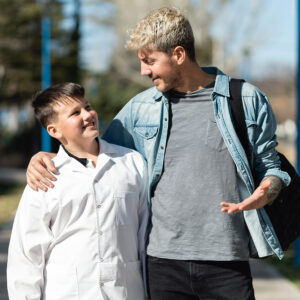What is Kinship Care?

September is National Kinship Care Month — and it’s a meaningful opportunity to recognize and celebrate the nearly 2.7 million grandparents, close friends and relatives caring for children when biological parents are unable. The care they provide is life-changing for children experiencing foster care.
With kinship care gaining traction as a permanency option for children within foster care, professionals like those here at KVC Kansas are working to remove barriers to placement and allow children to remain safely connected to their family ties. By spreading the word about the importance of kinship care, learning the eligibility and supporting kinship providers or agencies like KVC, children will have a meaningful opportunity to maintain important family connections and increase accessibility to care. Let’s explore more about this special type of foster care.
Watch this video for an overview of KVC’s kinship department and hear a moving story of a mother and son reunited after 13 years all because of a KVC family finder.
What is Kinship Care?
When we think of foster caregivers, many of us picture an adult or family that doesn’t know the child in their care. Kinship care is different because of the pre-existing relationship. As an alternative to foster care or adoption, kinship care refers to the arrangement of care that is provided to a child by a family member or close friend when they are unable to live with their biological parents.
“Kinship care can be more like building a family forest than a family tree.”
The goal of kinship care is to maintain the child’s connection to their normal surroundings — both family and community. As Kim Smith, Director of Kinship with KVC Kansas, explains, “Kinship care is usually less traumatic for children because they already have a pre-existing relationship with the caregiver. It’s the hope that kinship care creates a more positive and less traumatic experience for the children moving through foster care, as opposed to transitioning into a home with caregivers they’ve never met.”
Who are Kinship Caregivers?

Dani Badas, LMSW, Director of Grants Management
Dani Badas, Director of Grants Management for the KVC Foundation, has experience with both sides of kinship care — working with KVC to provide support and services to children and caregivers, as well as providing kinship care in their own personal life to relative and non-relative children. “In some cases, kinship care is slightly different,” Dani says. “It can be someone who has a healthy relationship with a child such as a coach, family friend, teacher, neighbor or blood relative, and it’s all classified as kinship care.”
To this end, Badas has provided kinship care to six children, including some who have been related and some who have not. Badas’ experiences have illuminated both the joys and difficulties that come with foster and kinship care, and these examples bring understanding to the importance of kinship care and the positive impact that it can bring to a difficult situation.
The Importance of Kinship Care
The importance of kinship care goes beyond the immediate benefit of children already having an established relationship with their kinship caregivers. Although this is a significant benefit, there are many other advantages as well. These benefits include:
 Smoother Transition – Maintaining a sense of connection and continuity of a child’s biological family decreases the trauma and disruptive experience of separating from parents.
Smoother Transition – Maintaining a sense of connection and continuity of a child’s biological family decreases the trauma and disruptive experience of separating from parents.- Connected to Cultural Heritage – The emotional wellbeing of a child is enhanced when they’re able to stay connected to relatives who share cultural, ethnic and family backgrounds. This increases their sense of belonging and identity and continues traditions.
- Known Behavioral History – By already having a relationship, kinship caregivers will likely already have a sense of certain behaviors, triggers and strengths that are present in the child, allowing for a potentially easier transition into parenting.
- Maintaining Familial Relationships – Siblings might be more likely to stay together in kinship care. Beyond that, relationships with extended family members like cousins, aunts and uncles, and grandparents can provide additional support through the process.
- Encouraging Parental Involvement – Badas explains that “kinship care is not only easier for the children but creates an easier transition for parents and creates an opportunity to stay engaged.”
- Faster Reunification – Studies show that children in kinship care were able to return home an average of seven months earlier than those in traditional foster homes.
- Healthier Outcomes – Although the conclusion of adult mental health outcomes is still being studied, immediate outcomes of kinship care are associated with lowered rates of continuing behavioral issues and improved mental health.
It’s important to note that even with the numerous benefits of kinship care, each situation is unique, and KVC ensures that the wellbeing of the child is the primary consideration when determining the best care arrangements.
Features and Requirements of a Kinship Caregiver
Foster and kinship caregivers play an important role. It’s a role that supports families through a very difficult time in their lives and provides an opportunity to help children move through this transition with their safety and wellbeing in mind. Certain features present in great caregivers include:
- Loving all children unconditionally
- Providing continuous care until a permanent plan is implemented
- Working together with biological parents and child welfare professionals
- Continuing education
When someone considers becoming a kinship care provider, they must meet a few basic requirements. These requirements serve an important purpose and make sure children are safe and have the opportunity to thrive. Depending on the state or specific circumstances, the requirements may vary; however, we’ve compiled a list of the most common foster and kinship care conditions:
- Must be 21 years of age
- Meet basic income guidelines
- Provide adequate space and personal bed for each child
- Maintain reliable transportation
- Complete 30 hours of free foster parent training
- Complete background checks per the federal Adam Walsh Act
Kinship Care Through KVC
KVC holds many years of experience caring and supporting those experiencing foster or kinship care, and has learned so much along the way. Through this experience, KVC has molded and developed its practices, making them a leader in their field. KVC’s team of professionals works diligently to ensure each child and caregiver achieves the best possible outcome for their family – typically reunification is the primary case goal.
“Our kinship department’s role comes down to ensuring that a child’s connections are maintained once they enter foster care,” Smith says, focusing on connection and family at the forefront. “KVC digs deep into the family tree and tries to contact anyone for possible placement. Kinship care can be more like building a family forest than a family tree.”
Sometimes, caring for children really does take a village — and when it comes to building that strong village support system, Badas says, “KVC does it best.”
Becoming a kinship caregiver is an honor, and KVC is privileged to provide any help, support and guidance needed.
How You Can Help
Kansas kids need kinship caregivers and foster parents more than ever before. The most significant way you can help is by becoming a foster parent. If you’re interested, we’d love to answer any questions you may have and guide you through the process. Click here to contact us!



